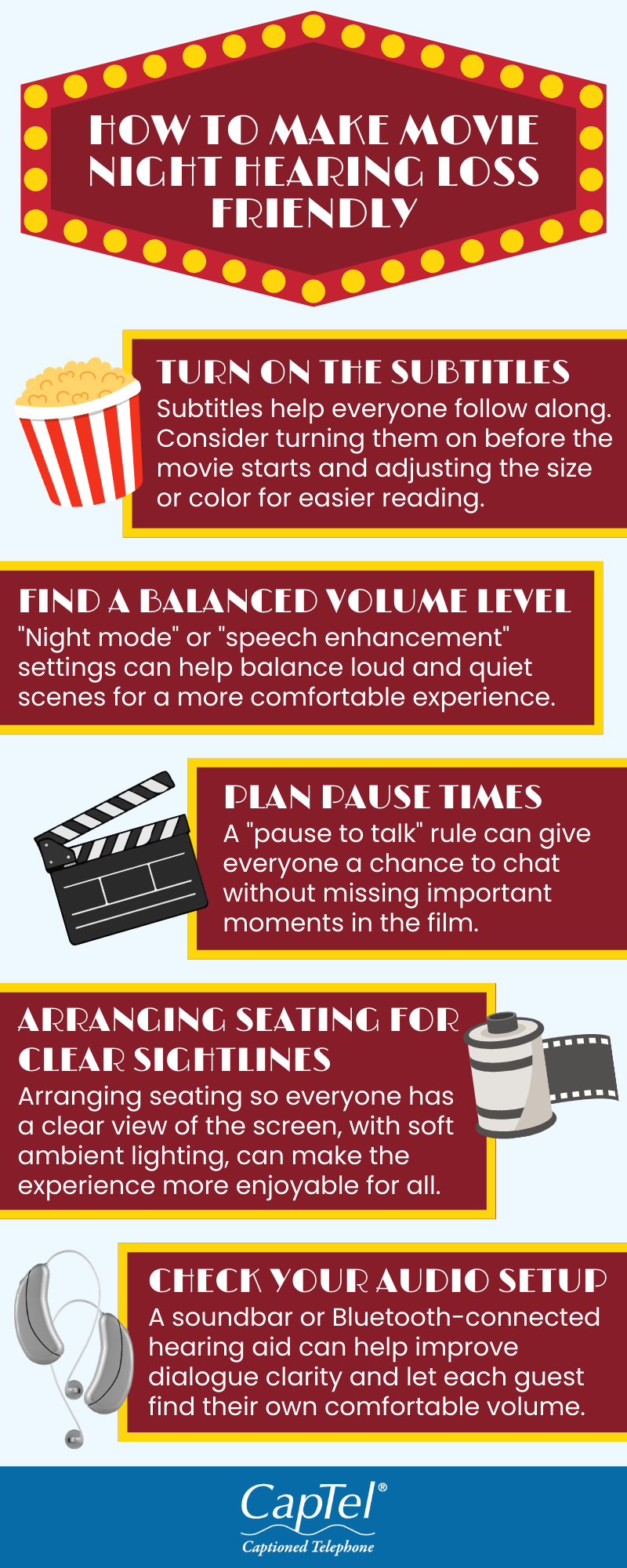Let’s take a look at how your TV plays a part in your hearing health.

For many of us, relaxing in front of the television is a common pastime. Whether it’s catching up on the news, enjoying a favorite movie, cheering on a sporting event, or following a gripping series, the TV provides entertainment and connection to the world. However, the way we listen to our television can significantly impact our hearing health. In this blog, we’ll explore how to enjoy your favorite shows while protecting your hearing health for years to come.
TV Volume and Hearing Loss
It might seem like a simple solution to turn up the volume when you’re not hearing clearly, but consistently listening to the TV at a high volume, especially for extended periods, can impact hearing loss over time. Think of your ears like any other part of your body – they can get fatigued and even damaged by excessive strain. Loud sounds, even from something as familiar as your television, can damage the delicate inner ear that is responsible for transmitting sound signals to your brain. Once these cells are damaged, the hearing loss is often permanent.
Smart Strategies for Healthy TV Listening
Fortunately, there are several proactive steps you can take to protect your hearing while still enjoying your favorite programs:
- Moderate the Volume Level: Try to find a volume level where you can comfortably hear the dialogue without it feeling overly loud or straining your ears. If others in the room find the volume too high, that’s a good indication it probably is. Take note of what volume level you find yourself settling on; if it changes, it may be time to visit the audiologist.
- Turn on Subtitles and Closed Captions: This is a fantastic tool for everyone, and can be especially useful for those with hearing loss. Turning on subtitles or closed captions allows you to follow the storyline without needing to crank up the volume. Most modern televisions have this feature easily accessible in the settings.
- Take Regular Listening Breaks: Just like taking breaks from reading or computer work, give your ears a rest from the auditory stimulation of the TV. During commercial breaks or between shows, try muting the TV or engaging in a quiet activity. Even a few minutes of silence can make a difference.
- Consider Wireless Headphones or Earbuds: If you live with others who prefer a lower volume, or if you find it difficult to hear the TV clearly without increasing the sound for everyone, consider using wireless headphones or earbuds that connect to your TV. This allows you to personalize the volume level directly in your ears without disturbing others, making it more enjoyable to enjoy programs together.
- Explore Connectivity with Hearing Devices: Many newer televisions and hearing aids offer seamless connectivity. This technology allows the sound from your TV to be streamed directly to your hearing devices at an optimal volume for your specific needs. This improves clarity and reduces the need for high external volume. Check your TV and hearing device manuals or consult with your audiologist to see if this is an option for you.
- Be Mindful of Sound Effects and Music: Sometimes, the background music and sound effects in movies and shows can be significantly louder than the dialogue. Be aware of this and adjust the overall volume to a comfortable level for speech, knowing that you may need to lower the volume during louder musical or action scenes. Some shows or games may have background noise reduction, which can allow you to understand dialogue or speech easily with reduced interference.
When to Seek Professional Help
If you’re consistently finding yourself turning the TV volume up very high, or if you’re struggling to hear conversations even at a reasonable volume, it’s a good idea to schedule a hearing evaluation with an audiologist. They can assess your hearing and recommend appropriatesolutions. Addressing hearing loss early can significantly improve your quality of life and prevent further hearing loss. If you are already seeing an audiologist, but notice a change in your clarity or volume levels while watching TV, it may be a good idea to schedule a visit, too.
Protecting your hearing health is an ongoing effort, and being mindful of your TV listening habits is a simple yet effective way to contribute to your overall well-being. By implementing these strategies, you can continue to enjoy your favorite shows for years to come while safeguarding your hearing health. For more tips on hearing loss, visit the CapTel blog.


